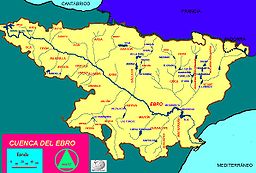
Ebro Treaty
Encyclopedia

Treaty
A treaty is an express agreement under international law entered into by actors in international law, namely sovereign states and international organizations. A treaty may also be known as an agreement, protocol, covenant, convention or exchange of letters, among other terms...
signed in 226 BC by Hasdrubal the Fair
Hasdrubal the Fair
Hasdrubal the Fair was a Carthaginian military leader.He was the brother-in-law of Hannibal and son-in-law of Hamilcar Barca...
of Carthage
Carthage
Carthage , implying it was a 'new Tyre') is a major urban centre that has existed for nearly 3,000 years on the Gulf of Tunis, developing from a Phoenician colony of the 1st millennium BC...
and the Roman Republic
Roman Republic
The Roman Republic was the period of the ancient Roman civilization where the government operated as a republic. It began with the overthrow of the Roman monarchy, traditionally dated around 508 BC, and its replacement by a government headed by two consuls, elected annually by the citizens and...
, which fixed the river Ebro
Ebro
The Ebro or Ebre is one of the most important rivers in the Iberian Peninsula. It is the biggest river by discharge volume in Spain.The Ebro flows through the following cities:*Reinosa in Cantabria.*Miranda de Ebro in Castile and León....
in Iberia
Iberian Peninsula
The Iberian Peninsula , sometimes called Iberia, is located in the extreme southwest of Europe and includes the modern-day sovereign states of Spain, Portugal and Andorra, as well as the British Overseas Territory of Gibraltar...
as the boundary between the two powers. Under the terms of the treaty, Carthage would not expand north of the Ebro, as long as Rome likewise did not expand to the south of the river. The exact date is unknown, but some time after 226 BC, Rome
Roman Republic
The Roman Republic was the period of the ancient Roman civilization where the government operated as a republic. It began with the overthrow of the Roman monarchy, traditionally dated around 508 BC, and its replacement by a government headed by two consuls, elected annually by the citizens and...
became affiliated with the town of Saguntum south of the Ebro River. Polybius
Polybius
Polybius , Greek ) was a Greek historian of the Hellenistic Period noted for his work, The Histories, which covered the period of 220–146 BC in detail. The work describes in part the rise of the Roman Republic and its gradual domination over Greece...
tells us that the Carthaginian general Hannibal had been looking for a pretext for war. After briefly consulting with the Carthaginian senate, Hannibal proceeded to besiege Saguntum which resulted in an eight month siege. The Roman senate upon hearing of the siege immediately sent embassies to consult with Hannibal and then with the Carthaginian senate. Initially the Roman embassies demanded that Carthage hand over Hannibal for attacking a Roman ally, which the Carthaginians refused. The Carthaginian senate stated that it was the Saguntines that began the war, and that the Romans had no grounds on which to accuse the Carthaginians. The Romans were unable to come to the aid of Saguntum before the town fell in 219 BC. After Saguntum fell the Romans made preparations for war and sent a second embassy to Carthage. Livy
Livy
Titus Livius — known as Livy in English — was a Roman historian who wrote a monumental history of Rome and the Roman people. Ab Urbe Condita Libri, "Chapters from the Foundation of the City," covering the period from the earliest legends of Rome well before the traditional foundation in 753 BC...
states that this second embassy was sent simply to follow the formalities of officially declaring war; meaning that the Romans fully anticipated a renewed war with Carthage. Both Livy and Polybius discuss the argument between the second Roman embassy and the Carthaginian senate before the declaration of war was made. The Roman envoys demanded that Carthage hand over Hannibal and any others responsible for the attack on Saguntum. It was at this point that the Carthaginian senate refused to acknowledge the Ebro treaty and also refused to hand over Hannibal to the Romans. The Carthaginians are said to have compared this treaty to the one made between Catulus and Hamilcar Barca
Hamilcar Barca
Hamilcar Barca or Barcas was a Carthaginian general and statesman, leader of the Barcid family, and father of Hannibal, Hasdrubal and Mago. He was also father-in-law to Hasdrubal the Fair....
in 241 BC. Here the Carthaginians argued that the Roman people refused to accept the treaty made between the two generals because it had not been ratified by the people. The Roman envoys refused to accept this argument, and unable to come to an agreement war was declared in 218 BC. The ensuing conflict is now known as the Second Punic War
Second Punic War
The Second Punic War, also referred to as The Hannibalic War and The War Against Hannibal, lasted from 218 to 201 BC and involved combatants in the western and eastern Mediterranean. This was the second major war between Carthage and the Roman Republic, with the participation of the Berbers on...
, and lasted until 202 BC.

